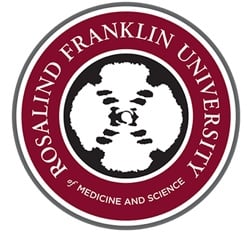School Stats
- Resident Tuition $37,213
- Non - Resident Tuition $37,213
- Application Fee $45
- AVG MCAT 495
- AVG GPA 3.3
- LIZZYM Score 54.5
Crime: Detailed Stats >
Admissions Information
- SCPM Admissions
- 3333 Green Bay Road
- North Chicago, IL 60064-3095
- United States
- Phone: (847) 578-3204
- Email: [email protected]
- Website: www.rosalindfranklin.edu/scpm/Home.aspx
School Overview
Rosalind Franklin University of Medicine and Science Dr. William M. Scholl College of Podiatric Medi Fast Facts
School Info
Offering exceptional training in podiatric medicine, Dr. William M. Scholl College of Podiatric Medicine (established in 1912) became a member of the University family in 2001. Scholl College is an institution that leads now for the same reason it will lead in the future the timeless quality of its forward-looking education.
Curriculum
The four-year curriculum at Scholl College is composed of Basic Biomedical and Clinical Science coursework and clinical experiences. Basic Biomedical Sciences coursework is taught in the first two years; Clinical Sciences coursework is taught in the first and second years and the first half of the third year. First-year courses consist of Clinical Anatomy, Biochemistry, Structure and Function, Neurosciences, Lower Extremity Anatomy, Microbiology and Immunology, Interprofessional Healthcare Teams, Fundamentals of Podiatric Medicine, and Community Health and Research. Many of these courses are similar to those in a traditional medical curriculum. The courses are taught as modules of varying length allowing final examinations to be staggered rather than concentrated into one final exam week. Second-year courses and clinical experiences consist of Pathology, Pharmacology, Essential Skills Experience, Biomechanics, Clinical Biomechanics and Sports Medicine, Introduction to Clinical Medicine, Peripheral Vascular Diseases, Dermatology, Podiatric Surgery and Anesthesiology, and Principles of Podiatric Radiology. The introductory Essential Skills Experience consists of orthosis fabrication, operating room techniques, clinical laboratory skills, anesthesia administration, clinical problem-solving activities, orthopedic workshops, radiology workshops, and closely supervised patient care of a palliative nature. The first part of the third year consists of courses in Podiatric Radiology, Neurology, Advanced Podiatric Surgery, Orthopedic Diseases, Practice Management and Jurisprudence, Medicine, and Pediatric Orthopedics. The remainder of the third year is spent in required, affiliated, and elective clinical clerkship experiences, all of which may include didactic sessions such as conferences, clinical case presentations, and lectures. Students spend their entire fourth year participating in required, affiliated, and elective clinical experiences. These clinical experiences take place at academic health science centers and community hospitals, on the Scholl College campus, at local area clinical facilities, and other affiliated programs outside of the Chicago area.
Facilities
The University's Basic Sciences Building is a 400,000-square-foot facility that houses a 52,000-square-foot Library and The Daniel Solomon, M.D., and Mary Ann Solomon Learning Resource Center, as well as administrative offices, classrooms, auditoriums, basic science departments, research and teaching laboratories, and dining areas. Major hospital affiliates include: North Chicago Veterans Affairs Medical Center, John H. Stroger, Jr., Hospital of Cook County, Mount Sinai Hospital and Medical Center, and Lutheran General Hospital. The University's clinical campus consists of the North Chicago Veterans Affairs Medical Center, The Clinics at Rosalind Franklin University, and the Rosalind Franklin University Center for Women's Health.


What are your suggestions for the admissions office?